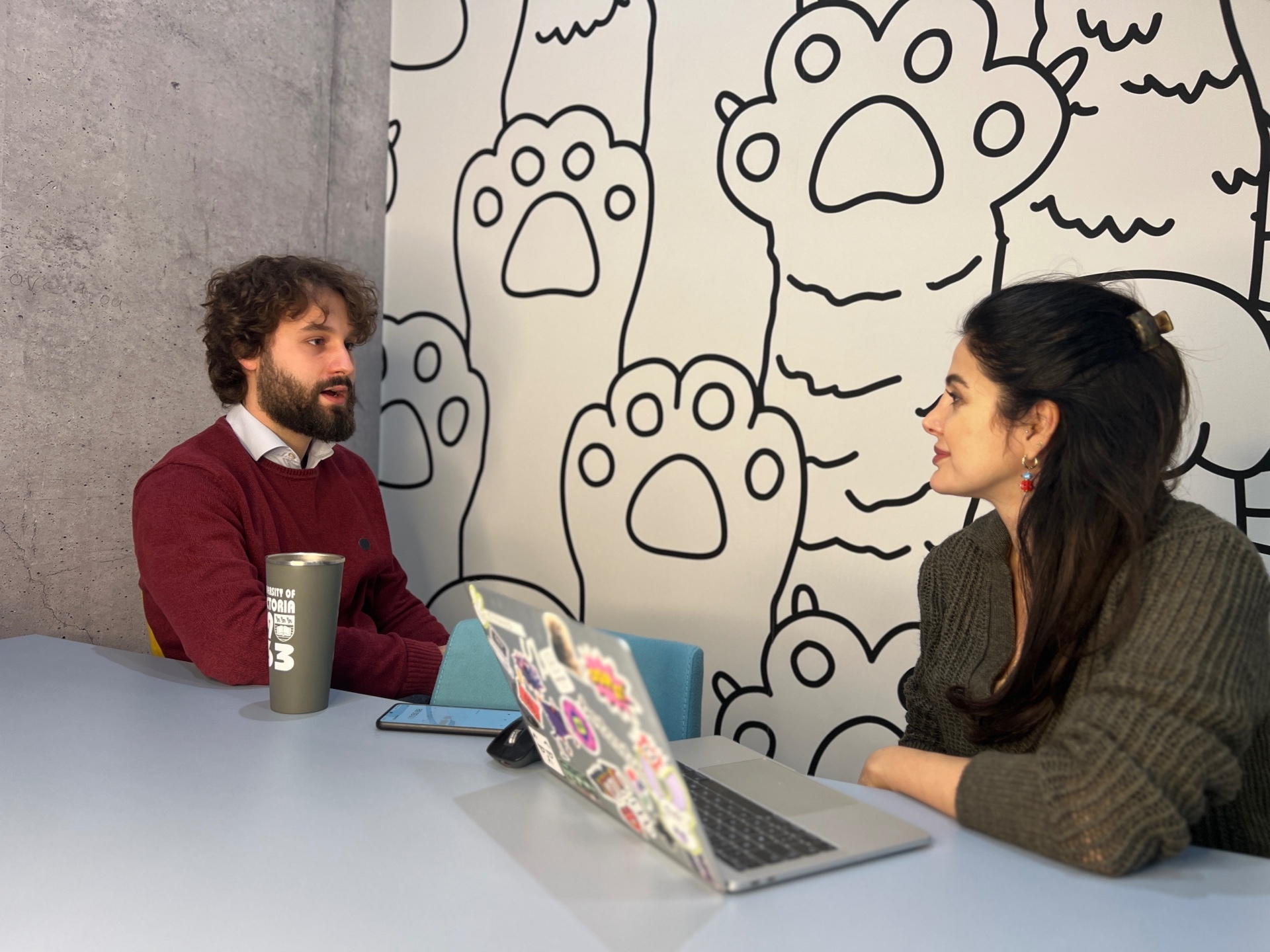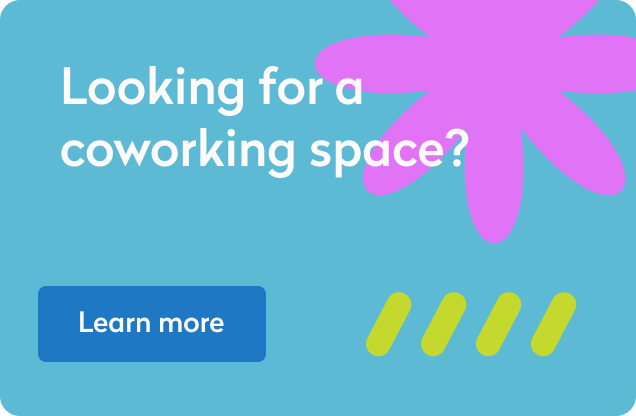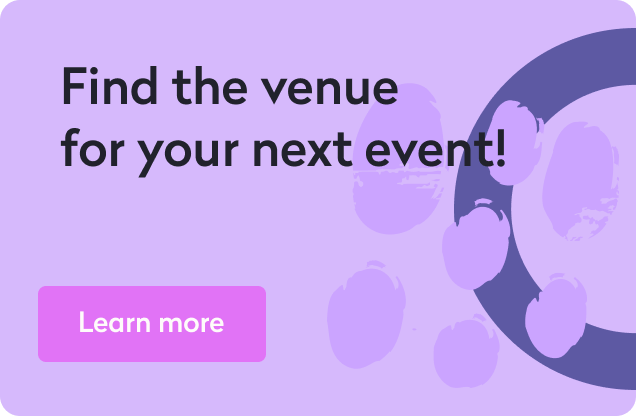Faruk is one of the first members of the new expanded tershouse community who joined us a few months ago. He says that he had never been a longterm member of any coworking space before, and to my surprise, after the first 7 days in tershouse, he wasn’t sure if it was the right fit for him. ‘But as a few more days passed and I met more people, I realized that this is literally the best thing, and I kept asking myself why I didn’t come here earlier. tershouse is great for people who usually work from home because here you have everything: entertainment, socializing, and a workspace.’
At first, he seemed reserved and like ‘just another developer,’ but that changed as we got to know each other better. I asked him how he would describe himself and how he sees himself. ‘I’d say that I’m a creative person first and foremost. As far as work goes, I always try to express this trait, and in IT, it’s not hard. Outside of work, my goal has always been to be someone who helps others; that’s been the case since childhood. There's a great book that helps you answer the question 'who you are,' by Simon Sinek, called Start with Why (a book that reveals why we do what we do). This book encourages you to examine your own rules and highlights the importance of your first happy childhood memory. 'I remember stealing cement from my grandfather’s garage to make mortar in my little truck, which I then used to patch up holes in the pavement in my street.' And today, my goal is the same — to help others in different ways. I try every day to patch the 'mortar holes' wherever I can.’
As human and beautiful as this ambition sounds, I reflect on how exhausting it can actually be. Faruk agrees and adds, 'Sometimes it’s so exhausting that it leads to burnout, but now I have mechanisms to prevent that, mostly through activities where I can shut off my brain, like sports and video games. And, of course, there are books, especially fantasy.' He says he’s happy he met a group of gaming enthusiasts (Alchemy Studio) in tershouse who are into game development. Faruk has had the chance in the past to try creating his own game. 'I definitely see myself doing that again in the future. I love music and directing, and games combine those two perfectly. It’s not excluded that I’ll end up creating something better than Flappy Bird, which I made with music by Haris Džinović,' he adds with a laugh.
A large number of developers in our community haven’t gone through formal education, so I was curious to know what Faruk’s path was like in that regard.
‘For me, University turned out to be a good way to find out what exists in the IT world. That way, we can discover what interests us the most, but when it comes to higher levels, we have to figure it out ourselves.’ He also adds that the industry itself is such that things are always changing.
‘I doubt anyone can start working right after University...I was lucky to have great mentors who recommended good materials for learning after 8 hours of work. That’s what successful developers do—they sit for an hour or two after work and read a good book. For example, ‘Dive into Design Patterns’ is an excellent book, especially the latest edition, even for people who have been doing object-oriented programming for years. It’s a great way to upgrade your knowledge. Most of it always comes from passion. I love what I do; for example, even though I’m on vacation, I’m still learning and following some lectures.’
Faruk started working while still studying at University. He’s currently a full-stack developer for a Scottish company called Snugg, which deals with energy, specifically renewable energy solutions for households. I was curious about his opinion on how far Bosnia and Herzegovina is from making this a part of everyday life and lifestyle. ‘That trend is already somewhat here. However, in the context of solutions, the market is oversaturated. What my company does is collect information about your home and then suggest solutions like solar panels and heat pumps, after which you can get loans and grants from the bank. However, the queues for such funding are enormous. That’s why it’s problematic here. We need to resolve the 'ground-based' issues first before this can really take off.’
I asked him what his most significant work experience has been so far and why. ‘The best experience I had was when I developed my own application; it was actually a 'bitter-sweet experience,' but it was also the hardest period because I didn’t know how to do it. It was a cool e-commerce platform that ultimately never took off.’ He then remembered another work experience with a team from the UK, which he describes as enriching because the team members were from all over the world. I followed up on that and asked about his experience working with local vs. foreign companies. ‘I’ve hardly worked for the local market; it mostly came down to doing services for friends. However, what I did conclude is that working with the British was easy because they are pragmatic, and we have a similar sense of humor and sarcasm,’ he adds with a laugh. ‘That's why shows like Only Fools and Horses did so well here.’
Faruk’s CV also features an interesting role as a lecturer at a programming academy. ‘What has stayed with me most from that experience is the pride of having developed a certain level of ambition and interest in the students. I think that’s something we’re generally lacking here: people who genuinely want to spark curiosity in others. Sadly, the IT industry is too often associated with motivation driven by money. The point of the academy I led wasn’t for the students to become masters of these technologies but to spark their curiosity so that, after the academy, they know how to continue exploring on their own. That, for me, was a success and the core point of the academy.’
Finally, I ask Faruk if he has a life motto that he follows both personally and professionally. ‘It might sound a bit ‘over the top’, but be kind to everyone, because it costs you nothing. That way, you create the best things in friendships and in business.’






